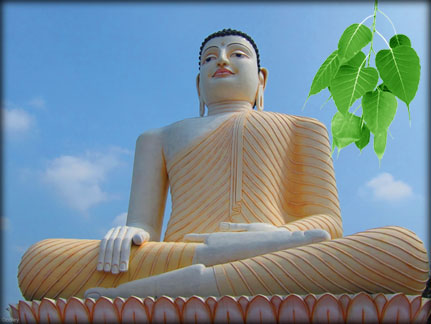|
Navam Full Moon Poya falls on Friday:
Consumerism - the Buddhist point of view
By Lionel Wijesiri
Over the past century, we have witnessed the spread of a new kind of
belief system that started mostly in Western Europe and the United
States. Like other ‘religions’, this new doctrine has its own priests
and places of worship, and has its beliefs about what a ‘meaningful’
life is and how to get it.
|

By living your life free of greed, hatred, and delusion, you
allow for the release of ignorance and the way of wisdom |
This new religion is known as consumerism, its priests are the
marketers and advertising agencies, its places of worship are the shops
and supermarkets and internet sales sites. Its main beliefs are that
happiness and success come from attaining wealth and buying the goods
and services available in the market in ever-greater amounts.
Consumerism has been fantastically successful in converting people,
in spreading quickly to almost every corner of the globe, and in
colonising humans’ minds, environments and social institutions.
Consumerism provides an artificial means of defining our existence by
suggesting that identities in the society are boosted through the
process of acquisition. The more you consume, the more you possess, the
more you are accepted in the ‘elite circle’. At the most fundamental
level, consumerism owes its vitality to the psychotic belief of the
autonomous individual self that exists independently of social relations
and of human relations.
Buddhist view
What is the Buddhist viewpoint on consumerism? In contrast to the
modern notion of frantic, ceaseless consumption, the Buddha said that
tranquillity meditation or Samatha Bhavana is the most important
prerequisite for self-cultivation and self-criticism. In terms of
meditative practices, Samatha refers to techniques which assist in the
calming of the mind. Its major goal is detachment from the external
world and a consciousness of joy and tranquillity.
Samatha means equanimity, equilibrium and balance. Don’t move to the
extremes, avoid extremes. Pain and pleasure are two extremes - don’t
choose. Don’t avoid either and don’t cling to either. Just remain in the
middle of it, watching, looking at it, unattached.
Such understanding helps an individual to recognise his or her limits
and to be more humble. At the same time, it promotes loving kindness and
compassion. The individual will be in a better position to witness the
suffering of others and to help eliminate the cause of suffering.
“Yes, it makes sense,” one might ask, “Yet, how could I practise
Buddhism in a culture fuelled by intense desire?” Actually, it can be
done. Basically, it is a simple equation. To live is to want. When we
are hungry, we want food. When we are tired, we want rest. When we are
alone, we want the company of friends and loved ones.
Buddhism doesn’t ask us to renounce companionship or the things we
need to live comfortably. The challenge is to distinguish between what
is wholesome - taking care of our physical and psychological needs - and
what is unwholesome.
We don’t have to run away from all of life’s pleasures. We should
learn to distinguish between the wholesome and the unwholesome - what
supports our practice and what hinders it. This in itself is practice.
Certainly, Buddhism does not teach that there is anything wrong with
working to earn money. Although monastics give up material possessions,
lay people do not. The challenge is to live in a material culture
without getting snared by it.
It isn’t easy, and we all stumble, but with practice, desire loses
its power to jerk us around. Finally, it can be done.
Delusion
Through the ever-increasing domination of ‘market’ values such as
competition and hyper-individualism, we become bewildered about how to
relate to the world. With the market perpetually designing new ‘needs’
for the individual, the terms ‘need’ and ‘want’ have become virtually
synonymous.
Buddhist systemic psychology sees that greed naturally concocts
Avidya or delusion. With the loss of a discriminating mind which
distinguishes between need and desire, the door is open to swim in the
ocean of delight and numbness in consumer goods and experiences.
The media, principally television, is the foremost component of this
delusion. It not only offers a myriad of entertainment without depth or
meaning, but is fuelled by advertising millions, thereby spreading the
ethic of greed every 10 minutes with commercials.
The consequences of this delusion is multi-fold. It leaves the
individual distracted and disconnected from him/herself and his/her
surroundings. With so many teledramas and variety shows to watch on
television, so much shopping to do, so many trips to take, we have less
and less time to check in on our families, our relationships, our
neighbours and, most importantly, ourselves.
From the turning on of the television first thing in the morning to
the car stereo or mobile bluetooth on the way to work, to passing out in
front of the television at night, the time to constructively ponder and
plan a more meaningful life is washed away.
Sila, Samadhi and Panna
Buddhism has a number of integrated practice systems for structural
adjustment to avoid the ill-effects of consumerism. Perhaps, the most
straightforward yet profound conditions are the three inter-connected
practices Sila-Samadhi-Panna (morality-concentration-wisdom).
|

Shopping has become a pastime among youth, even those with a
limited income |
Firstly, in the face of unlimited greed, Sila offers a starting point
in a system of discipline and ethics. The essence of Sila is the letting
go of certain pleasures for the opportunity to experience a higher
meaning or to perform a morally higher task. For example, a student
limits his/her ‘partying’ to graduate on time. The expressions are
endless.
By adopting the basic practices of Sila, we begin to reassert the
value of simplicity into our lives so that those in poverty are not seen
in the right perspective. Our traditional Buddhist society once viewed a
person of wealth, not by how much they had accumulated personally, but
by how many dansalas and ambalamas they had established.
With the renouncement of consumerism as an active social value, it
becomes clearer to the rich what they actually need for a basic
comfortable life. The rest is excess, to be shared with subordinates and
those of lesser means among one’s associations and community.
In the space and simplicity created from a life with a lower level of
material desires, the second component of Buddhist practice enters,
namely, Samadhi or concentration. We begin to notice how other family
members spend their time. Intricacies in a loved one’s state of being
become apparent. Neighbours become like colleagues or extended family
rather than faces next-door.
Most centrally, our body, mind, emotions and our interaction with the
world become more conscious. In short, connections in a disconnected
world begin to be restored.
We realise that the action films, multi-media entertainment, caffeine
and nicotine and shopping mall dazzle of our consumer culture all make
our breathing shorter and quicker and, in turn, make our thoughts faster
and less-connected.
Sila opens our life to deeper experiences in the present. Samadhi
enables us to seize on these moments and penetrate them ever more
deeply. When this occurs, we begin to see the delusion of events
surrounding us. We begin to see the bite of our greed which had seemed
so pleasurable before.
We begin to see the non-lasting nature and instability of these
pleasures and the frustrations they dream up as they fade and as we
wrestle and writhe to re-light them. This is Panna or wisdom. It does
not end just here. It will enable us to see the causes and conditions of
events in our environment. |

